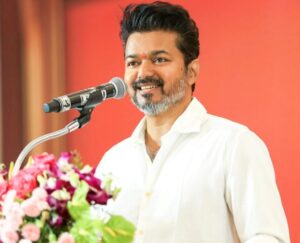
At a recent event organised by the Thamizhaga Vettri Kazhagam to honor top achievers in the tenth and twelfth standard exams, party chief and renowned actor Vijay made a strong statement against the National Eligibility cum Entrance Test (NEET). The event, held in Chennai, saw Vijay passionately advocating for the exemption of NEET, aligning himself with the sentiments of many in Tamil Nadu.
“People have lost faith in the NEET examination. The nation doesn’t need NEET. Exemption from NEET is the only solution,” Vijay stated emphatically. He voiced his full support for the recent resolution passed in the Tamil Nadu State Assembly seeking exemption from NEET, urging the Union Government to heed the emotions and concerns of Tamil Nadu’s people. “I wholeheartedly welcome the resolution against NEET. I request the Union Government to respect the emotions of the people of Tamil Nadu. Education should be brought under the State List from the Concurrent List,” he added.
Vijay highlighted the detrimental impact of NEET on rural students, emphasizing that the diversity in education systems across the states should be seen as a strength rather than a weakness. “The rural students are greatly affected by NEET. Diversity is strength and it is not weakness,” he remarked.
In his advice to the students, Vijay encouraged resilience and optimism. “Don’t get disheartened if you lose something. There is always another possibility in your life,” he advised, urging students to remain hopeful and persistent in the face of setbacks.
Notably, Vijay’s use of the term “Ondriya Arasu” to refer to the Central Government aligns with the terminology preferred by the Dravida Munnetra Kazhagam (DMK) and its allies, further signaling his support for their stance on educational autonomy and NEET.
The event served as a platform for Vijay to voice his support for educational reforms that would better serve the diverse needs of students across Tamil Nadu. His statements have added significant weight to the ongoing debate about NEET and the broader discussion on state versus central control of education.

